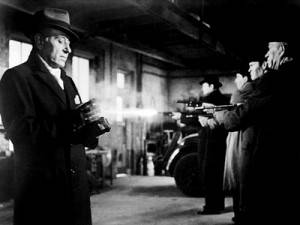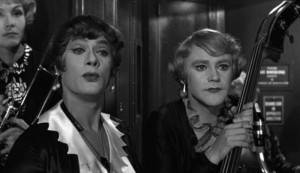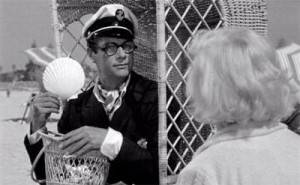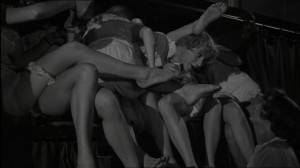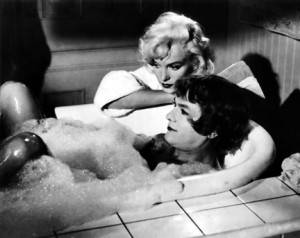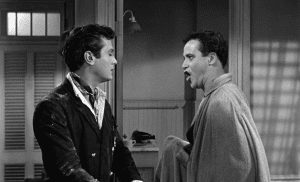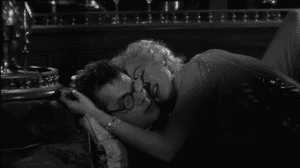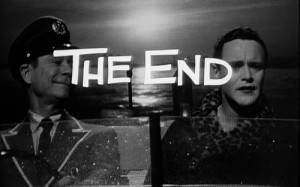I stated in my previous Jack Lemmon article that Some Like It Hot was a touchstone film for me when I first saw it as a 12 year old about to be bitten by the acting bug. It started my fascination with the craft of which, like many, I felt that Lemmon was the master. This view was not shared by my schoolmates, who ribbed me constantly for what seemed to them an inappropriate obsession with a comical figure from a bygone age, and I was often asked why I wasn’t fanatical about serious actors from my own era, such as Jack Nicholson or Robert De Niro? Obviously, I now have a tremendous amount of admiration for both those performers, but at the time, studying Lemmon was almost a sacred pursuit for me.
I even made a short documentary film about Jack in my last year at school in which I interviewed the students and teachers asking them to name their favourite Lemmon movie and, not surprisingly, Some Like It Hot was the overwhelming response; which makes reviewing it somewhat of a thankless task, as almost everyone on the planet has seen this film at least once in their lives and it was voted by the American Film Institute as the funniest comedy of all time. It’s safe to say that its popularity is not limited to the fact that it includes Marilyn Monroe’s finest performance, although that has obviously helped to maintain audience interest over the decades.
Billy Wilder left Austria during the rise of Adolf Hitler and travelled as a journalist via Paris, ending up in Hollywood in 1933 where he took the job of as a studio staff writer. He very quickly attained the reputation of an author of bitingly cynical yet exceedingly funny screwball farces like Ball Of Fire and Ninotchka and graduated to directing his own scripts in the 1940s, which were often ‘noirish’ dramas like Double Indemnity or The Lost Weekend, culminating with scathing satires of his chosen professions Sunset Boulevard (Cinema) and Ace In The Hole (Journalism) in the early 1950s.
In 1957, Wilder collaborated with another writer, I.A.L. Diamond (Izzy to his friends) on the screenplay for the romantic comedy Love In The Afternoon, marking the start of a successful collaboration, the high point of which is arguably Some Like It Hot, made in 1959 and originally conceived as a star vehicle for Tony Curtis cast as Joe the struggling saxophonist and dogged lady’s man whose co-stars were set to be Frank Sinatra as Jerry and Mitzi Gaynor as Sugar. Fortunately, Wilder was not entirely comfortable with Sinatra’s involvement, expecting difficulties from his notorious mob connections given the film’s depiction of murderous gangsters, and when he needed another big name star, he turned to Marilyn Monroe for Sugar, which opened the door for relative newcomer Jack Lemmon to take the role of Jerry.
The premise of Some Like It Hot seems pretty tame to a modern audience, two down-to-heeled musicians having to flee in drag after witnessing St. Valentine’s Day massacre, but in 1950s America the studios were still very much answerable to the League Of Decency, a Catholic lobby group that condemned the film for depicting excessive violence and promoting transvestism and homosexuality. Wilder convinced United Artists to put the movie out without a rating in defiance of the attempts to censor it by the church authorities; this was a watershed period which led to the abolition of the much feared Hays Code, which had been present since the early 1930s and dictated ridiculous regulations such as in bedroom scenes couples should keep one foot on the floor at all times and that toilets could never be shown on screen!
It seems futile to list the many high points of the film as most readers are no doubt familiar with them and I would rather not spoil it for those who have yet to see them; suffice to say that those seeing Some Like It Hot for the first time on this Blu-ray release are in for a massive treat. MGM/UA did a magnificent job in restoring the film in 2006 and this on upscale is a further improvement; the 1080p/AVC encode offers an immaculately spotless picture showing off the crisp, perfectly balanced, monochromatic photography and stylish lighting, particularly effective at exhibiting Marilyn Monroe’s abundant charm; she also benefits significantly from the DTS-HD 5.1 soundtrack remaster of her 3 showcased songs, whilst the dialogue is maintained front and centre so not to miss a word of Wilder and Diamond’s textbook screenplay.
It’s a minor disappointment that there is little in the way of new extras presented here. The previous DVD release included both the Making of Some Like It Hot plus the Nostalgic Look Back discussion between film historian Leonard Maltin and Tony Curtis at the Formosa Café on Santa Monica Boulevard, a regular celebrity hangout in the 1950/60s prominently featured in director Curtis Hanson’s L.A. Confidential. Hanson is also on hand here presenting the Legacy of Some Like It Hot, serving as a tour guide of the Paramount Pictures backlot, where Billy Wilder had an office for 20 years, and reminisces over the movie’s massive creative influence. There is also a patchwork audio commentary featuring a discussion between I.A.L. Diamond’s son, Paul and the writing duo of Lowell Ganz and Marc ‘Babaloo’ Mandel, their work on classic 1970s sitcoms like Happy Days led them to pen the script for Ron Howard’s Splash, and they seem as surprised at their involvement in the proceedings as we are; luckily the track is liberally peppered with contributions from Lemmon and Curtis.
Some Like It Hot is a very welcome Blu-ray release and it’s always encouraging to see that classics are getting the high definition upgrading they deserve. It simply never looked any better and this will help preserve their memory for future generations and continue to inspire new writing talents. It’s just a shame the extras are a little thin on the ground, as I think there is enough material to justify a newly minted feature-length documentary presented in HD still, as the film’s closing line attests, “Nobody’s perfect!”

